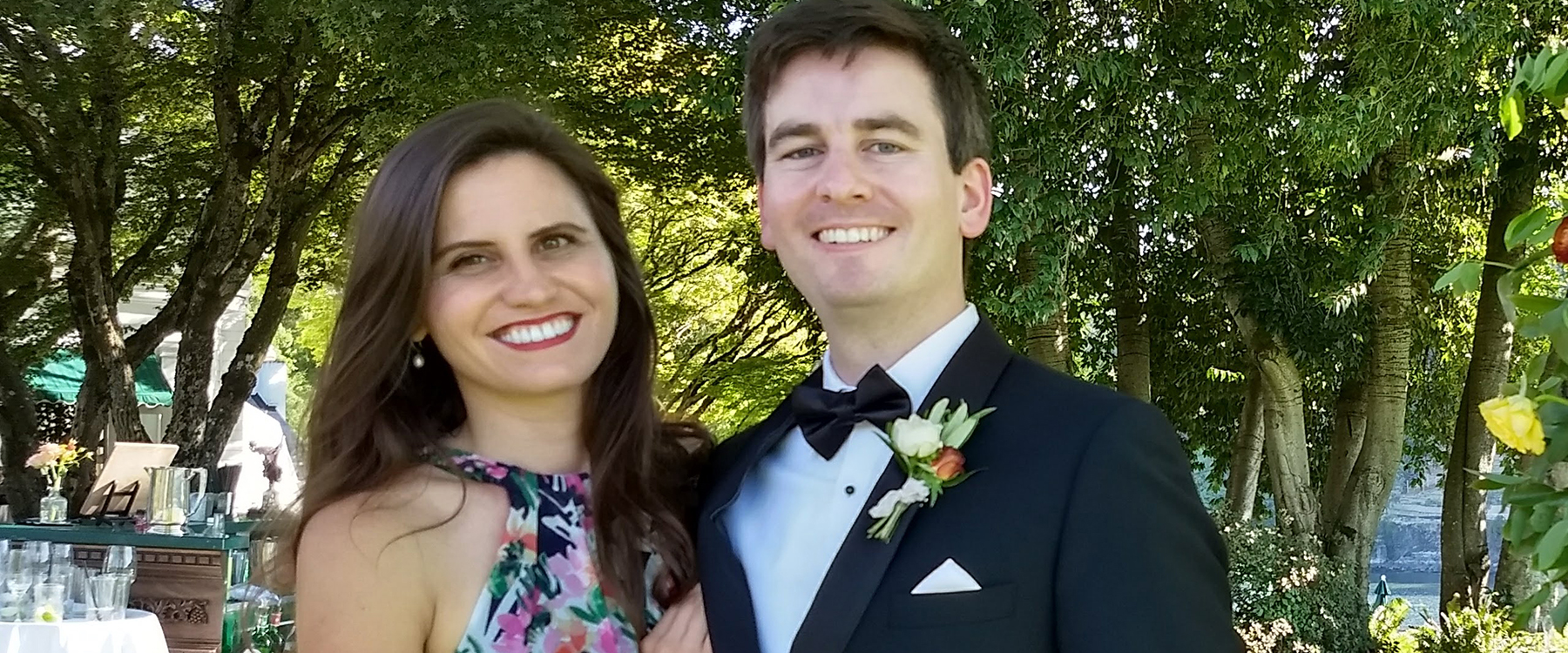Only 10% of patients who experience sudden cardiac arrest survive, and for those who experience it out of the hospital, the survival rate is less than 6%. Improving this outcome has become the focus of emergency department physician and OHSU School of Medicine assistant professor and residency program alum Joshua Lupton, M.D., M.P.H., R. ’20. His stake in improving outcomes is personal: Lupton is one of the less than 6% who survived.
Near the end of his third year of medical school, Lupton and his then-fiancée, now-wife, Katherine Lupton, had been training to run in a half-marathon competition. On the day of the race, Lupton was nearing mile 13.
“The finish line was finally in sight,” he said. “I was eager to get there, enjoy my post-race beer and spend the rest of my weekend away from the hospital, relaxing.”
Lupton’s next memory is waking up in the Johns Hopkins ICU, the same hospital where he had been studying as a medical student. He suffered from short-term memory loss when he woke and repeatedly asked his fiancée to tell and retell the painful story.
“The first 48 hours, I’m re-asking the same questions over and over again,” he said. “She had to tell me probably 50 times, ‘You were running this race, then you collapsed, you had cardiac arrest, they did CPR and you were flown by helicopter. Now you’re here, you were intubated and you’re in the ICU.’”
As a medical student, Lupton understood that if one link in that chain had been missing, he likely would not have survived and recovered. A series of tests revealed no structural problems with his heart. But an abnormality in his electrocardiogram indicated his attack may have been caused by an inherited electrical problem.
“I’m from Oregon, and my hope is that OHSU becomes the world leader in cardiac arrest research and that we develop data that will improve outcomes.”
Joshua Lupton
Within a few days of his collapse, Lupton had surgery to insert an automatic implantable cardioverter-defibrillator, which nearly eliminates the risk of dying from another incident. He experienced a complete recovery from his cardiac arrest and was able to finish his studies and graduate the following year with an M.D. from Johns Hopkins University. A native Oregonian, Lupton was thrilled to return to the Pacific Northwest and complete his residency in emergency medicine at OHSU.
“It really solidified that I wanted to focus on emergency medicine as a specialty, and that my area of research was going to be cardiac arrest, and in particular, the early care of cardiac arrest patients,” he said.
In the years following his cardiac arrest, Lupton and his wife, who has vivid memories of witnessing her husband’s collapse, realized there was a need for a support group for survivors, as well as their loved ones. They reached out to a national survivors’ group, the Sudden Cardiac Arrest Foundation, and together helped to found the first statewide affiliate.
Their Oregon affiliate group was formed at the start of the COVID-19 pandemic, so their meetings have all been virtual. Meeting online has enabled them to welcome survivors and their loved ones from throughout Oregon as well as from Washington, California, Utah and Nevada.
“People have joined our virtual meet-ups from all areas because there’s a need for this sort of post-survivor kind of care,” Lupton said.
At OHSU, Lupton relies on his personal experience as well as his research in early care of cardiac arrest patients to share insights with students, residents, fellows and specialists.
“I try to empower our emergency medicine residents to be experts within this disease process and advocate for patients in an evidence-based way,” he said. “A lot of evidence suggests that we’re a little too early to withdraw care for cardiac arrest patients. Using my story along with the research can help shift the narrative for those patients.”
Lupton’s research is focused on optimizing early care for cardiac arrest patients and testing current practices. Some of the areas he is interested in exploring include whether defibrillator pads are currently applied in the best way, whether police officers carrying automated external defibrillators should be more heavily utilized in cardiac emergencies and whether physicians should adjust the order in which drugs are currently administered to cardiac arrest patients. He asks, “Once someone has the arrest, what is the best way to administer care and resuscitation in order to make them a survivor?”
As a proud alum, Lupton says, “I’m from Oregon, and my hope is that OHSU becomes the world leader in cardiac arrest research and that we develop data that will improve outcomes.” He is passionate about making OHSU a cardiac arrest center with dedicated teams focused on cardiac arrest patients and care, including follow-up care after patients are discharged.
“For alumni and folks looking to donate, it’s important to know that this work is transformative and will grow in the future,” he said.




